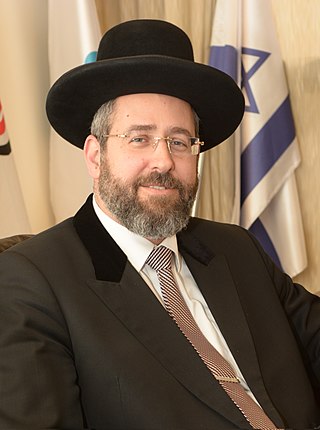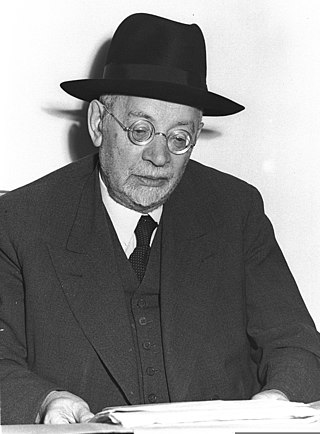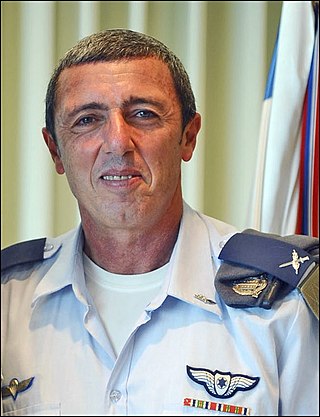
Conversion to Judaism is the process by which non-Jews adopt the Jewish religion and become members of the Jewish ethnoreligious community. It thus resembles both conversion to other religions and naturalization. The procedure and requirements for conversion depend on the sponsoring denomination. Furthermore, a conversion done in accordance with one Jewish denomination is not a guarantee of recognition by another denomination. Normally, though not always, the conversions performed by more stringent denominations are recognized by less stringent ones, but not the other way around. A formal conversion is also sometimes undertaken by individuals whose Jewish ancestry is questioned or uncertain, even if they were raised Jewish, but may not actually be considered Jews according to traditional Jewish law.

Shlomo Riskin is an Orthodox rabbi, and the founding rabbi of Lincoln Square Synagogue on the Upper West Side of New York City, which he led for 20 years; founding chief rabbi of the Israeli settlement of Efrat in the Israeli-occupied West Bank; former dean of Manhattan Day School in New York City; and founder and Chancellor of the Ohr Torah Stone Institutions, a network of high schools, colleges, and graduate Programs in the United States and Israel.
"Who is a Jew?" is a basic question about Jewish identity and considerations of Jewish self-identification. The question pertains to ideas about Jewish personhood, which have cultural, ethnic, religious, political, genealogical, and personal dimensions. Orthodox Judaism and Conservative Judaism follow Jewish law (halakha), deeming people to be Jewish if their mothers are Jewish or if they underwent a halakhic conversion. Reform Judaism and Reconstructionist Judaism accept both matrilineal and patrilineal descent as well as conversion. Karaite Judaism predominantly follows patrilineal descent as well as conversion.

Shlomo Moshe Amar is the former Sephardic Chief Rabbi of Israel. He served in the position of Rishon LeZion from 2003 to 2013; his Ashkenazi counterpart during his tenure was Yona Metzger. In 2014 he became the Sephardic Chief Rabbi of Jerusalem.
Religion in Israel is manifested primarily in Judaism, the ethnic religion of the Jewish people. The State of Israel declares itself as a "Jewish and democratic state" and is the only country in the world with a Jewish-majority population. Other faiths in the country include Islam, Christianity and the religion of the Druze people. Religion plays a central role in national and civil life, and almost all Israeli citizens are automatically registered as members of the state's 14 official religious communities, which exercise control over several matters of personal status, especially marriage. These recognized communities are Orthodox Judaism, Islam, the Druze faith, the Catholic Church, Greek Orthodox Church, Syriac Orthodox Church, Armenian Apostolic Church, Anglicanism, and the Baháʼí Faith.

The Military Rabbinate is a corps in the Israel Defense Forces that provides religious services to soldiers, primarily to Jews, but also including non-Jews, and makes decisions on issues of religion and military affairs. The Military Rabbinate is headed by the Chief Military Rabbi, who is ranked a Brigadier General. The current Chief Military Rabbi is Eyal Krim.

The Chief Rabbinate of Israel is recognized by law as the supreme rabbinic authority for Judaism in Israel. The Chief Rabbinate Council assists the two Chief Rabbis, who alternate in its presidency. It has legal and administrative authority to organize religious arrangements for Israel's Jews. It also responds to halakhic questions submitted by Jewish public bodies in the Diaspora. The Council sets, guides, and supervises agencies within its authority. In 2024, the High Court of Justice ruled that women are eligible to serve on the Chief Rabbinate Council, and as rabbis on the Chief Rabbi Election Assembly.

Yehuda Leib Maimon was an Israeli rabbi, politician and leader of the Religious Zionist movement. He was Israel's first Minister of Religions.

In Israel, marriage can be performed only under the auspices of the religious community to which couples belong, and inter-faith marriages performed within the country are not legally recognized. However, marriages performed abroad or remotely from Israel must be registered by the government. Matrimonial law is based on the millet or confessional community system which had been employed in the Ottoman Empire, including what is now Israel, was not modified during the British Mandate of the region, and remains in force in the State of Israel.

Eliyahu Yosef She'ar-Yashuv Cohen was the Ashkenazi Chief Rabbi of Haifa, Israel and the President of its rabbinical courts (1975–2011).
Hiloni, plural hilonim, is a social category in Israel, designating the least religious segment among the Jewish public. The other three subgroups on the scale of Jewish-Israeli religiosity are the masortim, "traditional"; datiim, "religious"; and haredim, "ultra-religious" ("ultra-Orthodox"). In the 2018 Israel Central Bureau of Statistics' survey, 43.2% of Jews identified as hiloni.

The Ministry of Religious Services, formerly the Ministry of Religious Affairs and Ministry of Religion, is a government ministry of Israel that handles Jewish and other religious affairs.

Avichai Rontzki was an Israeli Chief Military Rabbi of the Israel Defense Forces. He served in the position from 2006 to 2010, with a rank of Brigadier General. His predecessor in that position was Rabbi Israel Weiss. Rontzki was also the rosh yeshiva of the Hesder Yeshiva in Itamar.

Yitzhak Yosef is an Israeli Haredi rabbi. The former Sephardi Chief Rabbi of Israel, he also serves as the rosh yeshiva of Yeshivat Hazon Ovadia in Jerusalem's Romema neighborhood.

Rafael "Rafi" Peretz is an Israeli Orthodox rabbi and former politician. A former military officer and helicopter pilot who also served as the Chief Military Rabbi of the Israel Defense Forces, he was the leader of the Jewish Home party. Peretz was a member of the Knesset for the Yamina alliance until he separated from the faction in order to join the Netanyahu-led government.
ITIM is an Israeli not-for-profit organization founded in 2002 by Open Orthodox Rabbi Seth Farber to challenge the authority of the Israeli Rabbinate in matters of Jewish identity and Jewish life. ITIM addresses government policies that govern personal status in legal matters such as registering marriages and the right to enter Israel under the Law of Return that are determined in part by an individual's legal status as Christian, Muslim or Jewish.

Ron Yosef is the founder of the Israeli organization Hod, which represents Israeli gay and lesbian Orthodox Jews. His organization has played a central role in the recent reevaluation of the role of religious homosexuals in the Israeli Religious Zionist movement.

Yerushalmim is an Israeli local civilian organization and political party in Jerusalem.
Chuck Davidson is an American Orthodox rabbi who made Aliya to Israel. His willingness to challenge the religious establishment of the Israeli Chief Rabbinate, specifically in the realms of marriage and conversion, has been controversial.

Hashgacha Pratit (השגחה-פרטית) is an independent, Israel-based organization with both female and male clergy that self-describes as providing an alternative form of Orthodox Rabbinical authority and social activism group dedicated to challenging the monopoly of the Chief Rabbinate of Israel over religious ceremonies and practices, through the provision of private religious ceremonies. Founded in 2012 by Rabbi Aaron Leibowitz in Jerusalem, Israel, it offers alternative halachic services in life-cycle events, rabbinical training, and other courses in religious education. It has provided private kashrut supervision for restaurants, worked on raising public awareness and finding loopholes in the laws to circumvent the Chief Rabbinate's monopoly, first regarding Kashrut, by leading the movement to open the kosher food market to competition, and today regarding Orthodox wedding ceremonies.














